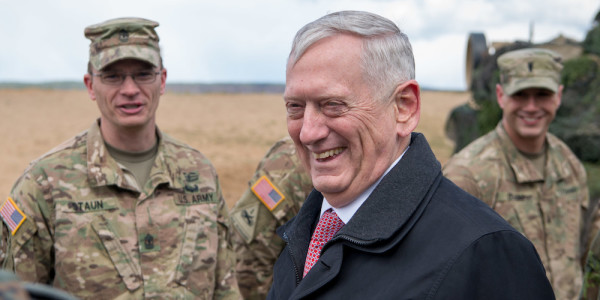

James Mattis is here for his money.
Appearing before the House Armed Service Committee on June 12 at 7 p.m. EST alongside Chairman of the Joint Chiefs of Staff Gen. Joseph Dunford, the secretary of defense will lay out his case for the Pentagon’s $639.1 billion fiscal year 2018 budget request before lawmakers.
“We in the Department of Defense are keenly aware of the sacrifices made by the
American people to fund our military,” reads Mattis’ opening remarks, distributed to the press by the American Legion. “Many times in the past we have looked reality in the eye, met challenges with Congressional leadership, and built the most capable warfighting force in the world. There is no room for complacency and we have no God-given right to victory on the battlefield.”
While lawmakers will have their turn to question Mattis themselves, here are some quick, key takeaways on Mattis in his own words:
1. Screw your politics
Mattis opened his remarks with a broadside against the political squabbling that’s hobbled legislative decisiveness in recent years, cautioning lawmakers to leave their politics at the door when they debate the merits of the Pentagon’s budget rather than rely on the continuing resolutions that “ our readiness and adaptation to new challenges.”
“I need bipartisan support for this budget request,” demanded Mattis in the remarks. “In the past, by failing to pass a budget on time or eliminate the threat of sequestration, Congress sidelined itself from its active Constitutional oversight role. It has blocked new programs, prevented service growth, stalled industry initiative, and placed troops at greater risk. Despite the tremendous efforts of this committee, Congress as a whole has met the present challenge with lassitude, not leadership.”
2. The sequestration has screwed the military over for years.
The real target of Mattis’ testimony is sequestration, the automatic defense spending cuts that came out of the petty debt-ceiling debate of 2011. The only reason U.S. military hasn’t completely collapsed abroad despite an expanding theater of operations and high-operational tempo are the troops who actually have to deal with the consequences of political bitchiness downrange.
“For all the heartache caused by the loss of our troops during these wars, no enemy in the field has done more to harm the readiness of our military than sequestration,” according to Mattis. “We have only sustained our ability to meet America’s commitments abroad because our troops have stoically shouldered a much greater burden.”
3. We need new stuff, and lots of it
It’s no secret that Mattis personally moved to jam as many bombs as possible into the DoD’s budget, and every branch has a wish list of essential advanced technology designed to help troops adapt to the changing face of modern warfare. But that’s not because Pentagon agencies are simply churning out shinier toys each year like an iPod: The aging U.S. arsenal just won’t cut it anymore.
Sixteen years of constant war “has exhausted our equipment faster than planned,” according to Mattis. “Congress and the Department could not anticipate the accumulated wear and tear of years of continuous combat use. We have had to procure replacement gear and spend more money to keep gear serviceable and extend its service life. Due to this extensive use of our equipment across the force, operations and maintenance costs have also increased, rising faster than the rate of inflation during the past 16 years.”
4. We’re going to stay in Afghanistan for awhile
In a surprise visit to Kabul, Mattis touched off weeks of rumors regarding the U.S. military’s long-term presence in Afghanistan amid growing ISIS and Taliban insurgencies. But in his statement, Mattis affirmed that the United States will need to maintain a substantial force for years to come not just to stabilize the country, but the entire region.
“This need to preserve our security also requires us to sustain the international presence in Afghanistan to help stabilize the South Asia region and deny terrorists a safe haven,” according to Mattis. “Instability in the Middle East spills over into other regions. Extremists and extremist ideologies have spread to Europe, Africa, and Asia. Numerous countries are dealing with forced migration of people seeking to escape violence and despair, reminding us that problems originating in ungoverned or combat torn areas don’t remain there.”
5. We’re going back to space!
The traditionally neutral battlefield of outer space “is now contested,” according to Mattis. “This creates the need to develop capabilities and capacities for more resilient satellites designed to withstand persistent kinetic and non-kinetic attack.” Did somebody say Thor’s Hammer?
6. Get ready for more pay raises
Military pay and benefits are the single largest expense category for the DoD, encompassing a third of the Pentagon’s budget, according to Mattis — and that’s a good thing.
“I believe providing competitive pay and benefits is a necessity to attract and retain the highly qualified people needed in today’s military,” said Mattis. “Investment in military compensation, Blended Retirement, the Military Health System, and family programs are essential to fielding the talent we need to sustain our competitive advantage on the battlefield.”
But balancing that priority with “other investments critical to readiness, equipment, and modernization” will prove challenging, especially with Mattis’ dire warning that American air, sea, and ground forces remain threatened by new technologies.
WATCH NEXT:
